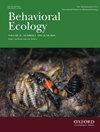Immune challenge changes social behavior in the guppy (Poecilia reticulata)
IF 2.5
3区 环境科学与生态学
Q2 BEHAVIORAL SCIENCES
引用次数: 1
Abstract
Abstract Increased exposure to pathogens is often considered to be one of the most significant costs of group living. As a result, animals typically avoid close association with individuals who manifest symptoms of disease. The question remains, however, whether avoidance behaviors are mediated by effects relating specifically to the disease itself, or through recognition of more general sickness behaviors that emerge from the activity of the immune system in response to infection. Here we examined the effects of an immune challenge, induced through exposure to bacterial lipopolysaccharides (LPS), on individual and social behavior in female guppies (Poecilia reticulata). We found that in a binary choice presentation, healthy focal individuals showed a strong preference to associate with stimulus shoals of saline-injected fish rather than stimulus shoals of LPS-injected fish. In a subsequent examination of group-level dynamics, shoals of LPS-injected females were more dispersed than similar shoals comprised of control fish and showed less coherent collective behavior despite the lack of any obvious difference in general activity between LPS and control fish. We discuss these findings in relation to the need for social animals to mitigate the risk of disease that is associated with living in proximity to conspecifics.免疫挑战改变孔雀鱼(Poecilia reticulata)的社会行为
暴露于病原体的增加通常被认为是群体生活中最重要的成本之一。因此,动物通常避免与出现疾病症状的个体密切接触。然而,问题仍然存在,回避行为是由与疾病本身相关的特定影响介导的,还是通过识别免疫系统对感染的反应活动产生的更普遍的疾病行为。在这里,我们研究了通过暴露于细菌脂多糖(LPS)诱导的免疫挑战对雌性孔雀鱼(Poecilia reticulata)个体和社会行为的影响。我们发现,在二元选择呈现中,健康的病灶个体表现出强烈的偏好与注射了盐的鱼的刺激鱼群相关联,而不是与注射了脂多糖的鱼的刺激鱼群相关联。在随后的群体水平动态检查中,注射LPS的雌性鱼群比由对照鱼组成的类似鱼群更分散,尽管LPS和对照鱼之间的一般活动没有明显差异,但它们的集体行为却不那么连贯。我们讨论了这些发现与社会性动物的需要,以减轻疾病的风险,这是生活在邻近的同类。
本文章由计算机程序翻译,如有差异,请以英文原文为准。
求助全文
约1分钟内获得全文
求助全文
来源期刊

Behavioral Ecology
环境科学-动物学
CiteScore
5.20
自引率
8.30%
发文量
93
审稿时长
3.0 months
期刊介绍:
Studies on the whole range of behaving organisms, including plants, invertebrates, vertebrates, and humans, are included.
Behavioral Ecology construes the field in its broadest sense to include 1) the use of ecological and evolutionary processes to explain the occurrence and adaptive significance of behavior patterns; 2) the use of behavioral processes to predict ecological patterns, and 3) empirical, comparative analyses relating behavior to the environment in which it occurs.
 求助内容:
求助内容: 应助结果提醒方式:
应助结果提醒方式:


